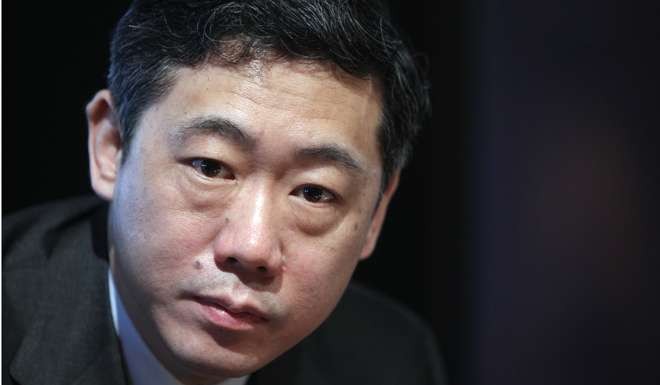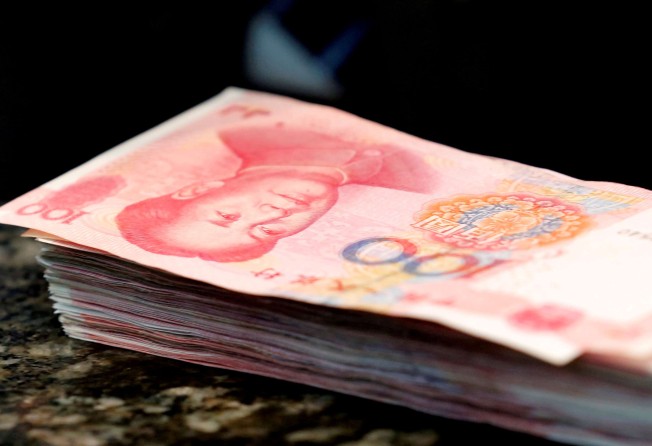
Yuan will slide by 5 per cent at most in 2017, says top economist
The current US dollar strengthening is ‘fragile’ while continued yuan devaluation ‘impossible’, says former PBOC official Li Daokui

The Chinese central bank will ensure the yuan falls no more than 5 per cent next year, according to Li Daokui, a professor of economics at Tsinghua University and a former central bank adviser.
Speaking at the Caijing annual forum in Beijing on Thursday, Li said he does not expect the currency to drop any more steeply than it has been recently.
“The People’s Bank of China has the ability to manage market expectations, and the yuan’s depreciation against the US dollar will be capped at 5, or 3 per cent for the next year,” said Li, who is director of the university’s Centre for China in the World Economy.
He was using an exchange rate of 6.8 per US dollar – a level regarded in the market as psychologically important – as a benchmark, which means the biggest depreciation he expects would be 7.14 by the end of next year.

The US dollar has been strengthening in the wake of Donald Trump’s shock victory in the presidential election, which has provoked pro-growth policy expectations.
The dollar index reached a 14-year peak at 100.57 on Wednesday, its highest since April 2003 before retreating to 100.42. It has risen 3.5 per cent over eight days, which would be the biggest such increase since May 2015.
Against the stronger US dollar, he Chinese currency slumped to an eight-year low on Wednesday. Its dramatic fall has fuelled concerns of a negative feedback loop in which the weaker currency causes a faster flow of capital out of China, which in turn leads to further depreciation.
A record US$44.7 billion left China in September in yuan payments, while the nation’s foreign-exchange stockpile shrank the most since January last month.
But most economists close to the decision makers are not forecasting any further drastic decline in the yuan.
Yao Yudong, former head of the Research Institute of Finance and Banking at the PBOC, said the strengthening of the US dollar recently was “fragile”, as it faced two downward risks from the currently undervalued Japanese Yen and British pound.
“Do not bet on continued depreciation of the yuan. It is impossible to happen,” he said during the same forum.
Yu Yongding, another economist and former central bank adviser, has suggested the Chinese government reinforce its implementation of capital account management, to relieve the pressure of supporting the exchange rate by draining its foreign reserves.
China’s holdings of US treasuries has declined to the lowest level in four years, as the central government cash out its positions to support the declining yuan.
The biggest foreign holder of US government debt had US$1.16 trillion in bonds, notes and bills in September, down US$28.1 billion from the previous month, according to US Treasury Department data released on Wednesday in Washington and previous figures compiled by Bloomberg.
That’s the lowest level since September 2012.
China’s foreign exchange reserves – the world’s largest stockpile – were down to US$3.12 trillion by the end of October, from a record US$4 trillion in June 2014.
China has spent more than US$800 billion in foreign reserves in the past two years, to prop up yuan, Yu said.
“In comparison, during the Asian financial crisis, the funds used by multiple countries to support local currencies was only US$200 billion,” he said.
“The devaluation expectation of the yuan will not ease if the government’s intervention slows down,” Yu said, suggesting the central government hand over the exchange rate to the market.
However, the central government could and should stick to the tool of capital account control, including reinforcing the implementation of the annual US$50,000 foreign currency exchange cap on individuals to “appropriately interfere with the foreign exchange market”, Yu added.
“The yuan would not devalue by 20 per cent in one go even if the rate is completely decided by the market. After all, the current pressure on the yuan comes mainly from a falling trade surplus and capital flight, not economic fundamentals,” Yu said.